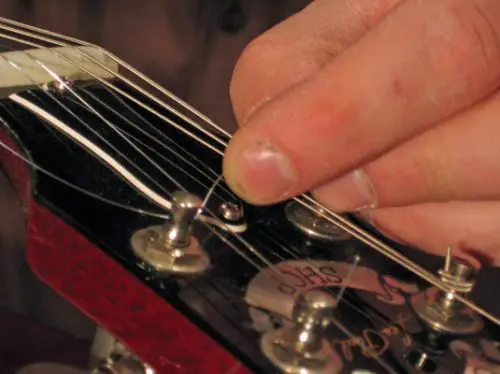Several factors will affect the tone of your guitar. A few of these factors are the gauge of your strings, the amount of string bending done, how heavy the strings are, how the guitar is being tuned, and the guitar’s action.
Think of the guitar as a rack that holds the guitar strings at a certain level of tension. Anything on the rack, so to speak, can and usually will influence the level of pressure on the strings. This will impact the overall intonation of the guitar.
As an experienced guitar and bass player for over 15 years, I can confirm that many factors will influence your guitar’s intonation. I can also ensure that there is no such thing as a guitar that stays perfectly in tune permanently. This is the bad news.
However, I can also confirm that there is good news. There are other things you can do and try to help your guitar stay in tune on a more regular basis.
Additionally, the more you tune your guitar, the more it regularly stays in tune. The more you tune your guitar, the more practice you will get in developing your ear to decipher pitch.
This article will cover tips to stay in tune more often. We will also cover several frequently asked questions, such as how string gauge affects guitar intonation, how heaver strings affect guitar intonation, does changing how you tune the guitar affect intonation, does string gauge affect guitar tone, does string action affect intonation and do heaver strings intonate better.
The following are list items that will impact your guitar’s intonation. Each list item has additional information you can use to help keep your guitar in tune as often as possible.
Also Read: Intonating Guitar 101: Cost, When & How Often To Do It (+FAQ)
1. String Gauge

String gauge can have an effect on intonation
String gage definitely can affect intonation. Different strings of different gages will stretch out differently and will therefore have a somewhat different sound.
A lighter-gaged string will have less tension, therefore creating less pressure on the neck of the guitar as well as the bridge of the guitar. This would also affect intonation.
Many guitars have a preferred gauge range, so it is a good idea to check with the manufacturer for the best recommendations. There are other factors of the guitar that can affect intonation as well.
Below are some examples of different string gauges that are available for the guitar. Please consider checking for preferred string gages with your guitar’s make, model, and manufacturer based on their recommendations:
| String Sets | E (high) | B | G | D | A | E (low) |
| Extra Light Gage | .008 | .010 | .015 | .021 | .030 | .038 |
| Light Gage | .009 | .011 | .016 | .024 | .032 | .042 |
| Regular Gage | .010 | .013 | .017 | .026 | .036 | .046 |
| Medium Gage | .011 | .014 | .018 | .027 | .037 | .048 |
| Heavy Gage | .012 | .016 | .020 | .032 | .042 | .054 |
Please refer to the chart above for the best string gauge for your playing style. The more strings you bend (pushing a string up toward the top or the bottom of the neck) to create a higher note, the more often your guitar will go out of tune regularly. This is because the strings are being moved and pulled from their original position.
However, there are a couple of ways to work around issues of intonation if you are incorporating string bending into your playing style.
- Get strings with a lighter gauge. Lighter strings will be easier to move and bend. The lighter they are, the easier they are to move. While the strings will not stay in tune perfectly, they will stay in tune more regularly than a heavier-gaged string if you are playing using bending techniques.
- Do bend with heavier gauged strings. It is physically possible to play bending techniques with heavier strings. However, since they are a bit more challenging to move on the fretboard, they will often eventually go sharp (the strings will ring higher than they should) and be out of tune.
2. Heavier Strings

Heavier gauge strings will intonate sharper
Heavier strings do affect intonation because they will typically vibrate less. The less a heavier and or thicker string vibrates, the less likely it is to go out of tune. However, as all strings do, they will eventually go out of tune and need to be tuned again.
Additionally, if you are playing a style of music where you are bending strings regularly as you are playing, then a heavier gage string may not be the best option since it will go out of tune more often. A lighter gauge string may be a better option if you are playing a style of music where you are regularly bending your strings.
An exception may be if you are playing with heavier strings and bending the strings regularly. This can cause heavier strings to go sharp (at a pitched sound above the intended note (Of course, all strings will go out of tune eventually. This includes heavier strings as well).
Also Read: High E Vs Low E Guitar Strings: Why Are There 2 Of Them?
3. Changing Tune

Changing tunings can definitely impact intonation
Changing tuning can and will affect intonation. A guitar is more likely to stay in tune if you were to tune it, going from a lower tone or flatter tone up to a tone that is in key with the instrument and in tune.
A guitar is also less likely to stay in tune if you go from a sharper note down to a flatter note.
Therefore, if you change your tuning process (being careful to go from low to high when tuning your guitar), you will positively change your intonation by changing how you tune the guitar.
If you are just starting to play and are unsure how to tell if you are flat or sharp properly, simply use a guitar tuner. There are several free options you can download to most smartphones.
4. String Action

higher action means more tension which causes the note to play sharp
The higher the string action affects guitar intonation because the more you must press down on the string to ensure it is pressed securely against the fret. The more distance you must go to press the string, the longer the string becomes.
When the strings are longer than they have to be, this will affect the guitar’s intonation. They will create a lower or flatter sound than they should, requiring you to tune the guitar more often.
Conclusion
We covered four items in detail that affect the guitar intonation and explained each one in detail.
If you feel your guitar is going out of tune much more frequently than it should be, please refer back to this article for additional ideas on how to help get the best intonation out of your guitar playing.
Please also remember that it is impossible to create a perfectly in-tune instrument that will always stay in tune flawlessly.
However, by following these ideas and taking these ideas into consideration, you will play an instrument that will stay in tune more often. You will also be able to pick the best type of gauge string for you and what you want to play.






